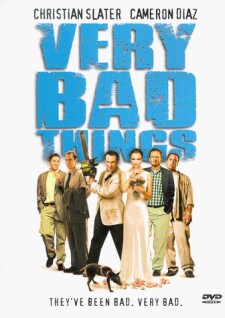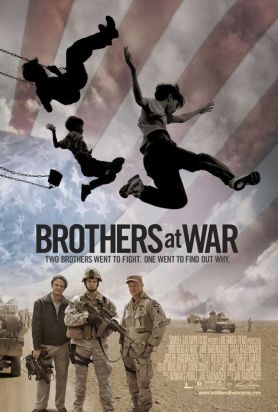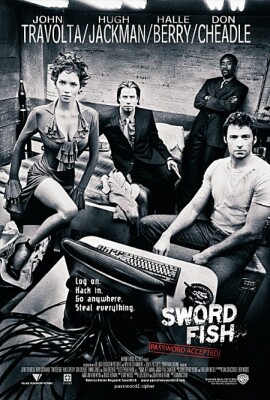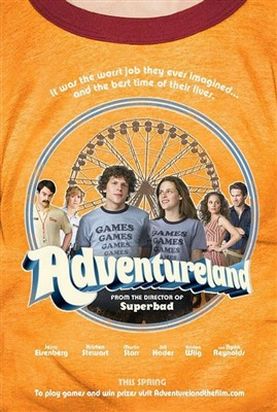Very Bad Things
Very Bad Things, written and directed by Peter Berg, aspires to be a black comedy but it forgets to be comic. The title is a true enough description of what is to be found inside, but as none of the bad things are also funny, the movie itself is merely. . .a bad thing. Jon Favreau plays Kyle, who is about to marry Laura (Cameron Diaz), a shrew who is obsessive about the details of her wedding and keeps ordering Kyle to get things, do things, arrange things. And while he is at it, to get some new friends. Four of the friends he has already — Boyd (Christian Slater), the brothers Mike and Adam (Jeremy Piven and Daniel Stern) and Charles (Leland Orser) — are intent on giving him a bachelor party in Las Vegas, but Laura is not at all happy about it. “I’m a creature like no other,” she tells him, “and I will not be common.”
Not, anyway, as common as the prostitute whom Boyd has hired to come to their hotel room in Vegas when all five are highly doped up with booze and cocaine. Like the good boy that he is, Kyle refuses what is a pretty frank offer of sex from her, but Michael is not so reluctant. Taking her into the bathroom, he engages in athletic sex with her until inadvertently he backs her up against a wall and drives a protruding hanging-hook through the back of her neck. Michael staggers out of the bathroom, covered in blood, and says: “I f***ed up.”When the others find that she is dead, Boyd manages to persuade them, for no reason but that there is cocaine in the room, that they should not call the police but take the body out and bury it in the desert. No one knows she was with them, so he thinks they have a chance to escape scot-free.
Just then, however, a hotel security man, called because of the noise in the room, comes in. At first it looks as if he can be sweet-talked and bribed into leaving, but then he sees the body. Boyd then kills him and so they have two bodies to dispose of. Boyd takes charge. “Trust me,” he tells the others. “Let me be the success coach.” He has them all go out to buy cleaning supplies and suitcases, and the next thing you know they have transported the two corpses out of the hotel and into the desert. But then they run into a problem. Adam refuses to bury them until the mixed up parts of the two bodies, all sawed up so as to fit in the suitcases, are unmixed and put together as one person on account of Jewish law. This (I think) is supposed to be funny.
Boyd is involved in some kind of positive-thinking, self-improvement program which is what is supposed to make him so aggressive and assertive. When Adam says that they will go to hell for what they have done, Boyd says scornfully, “Hell is for cowards, hypocrites — not for people who live by the strength of their own will.” I think this is supposed to be funny too. But Boyd is too nasty a character for us to treat him as a comic figure when he tries to calm the panic of his friends with some bit of jargon like: “This is not what we worked for in terms of self-management.” And I’m not quite sure it’s meant to be funny — though it’s funnier than most of the stuff that is — when Kyle offers up a prayer over the bodies, promising God that they will use a “second chance” to “fuel our productivity.”
The final scenes, which involve several more grisly deaths are even more unfunny. Somehow or other, Berg has now decided that he wants to make his film a comedy about the determination of Laura, in spite of several deaths, to have a perfect wedding: “Tomorrow I’m walking down that aisle come hell or high f****ing water,” she says — or, for that matter, another murder and desert burial. I guess if Berg supposes it was funny once, he must suppose it will continue to be funny no matter how many times it is repeated. But the rest of us may feel more like Laura who, left at the end for no apparent reason in charge of a couple of cripples and some bratty kids, ends the film crumpled in the middle of the road of a tract housing project, screaming.
Discover more from James Bowman
Subscribe to get the latest posts to your email.





